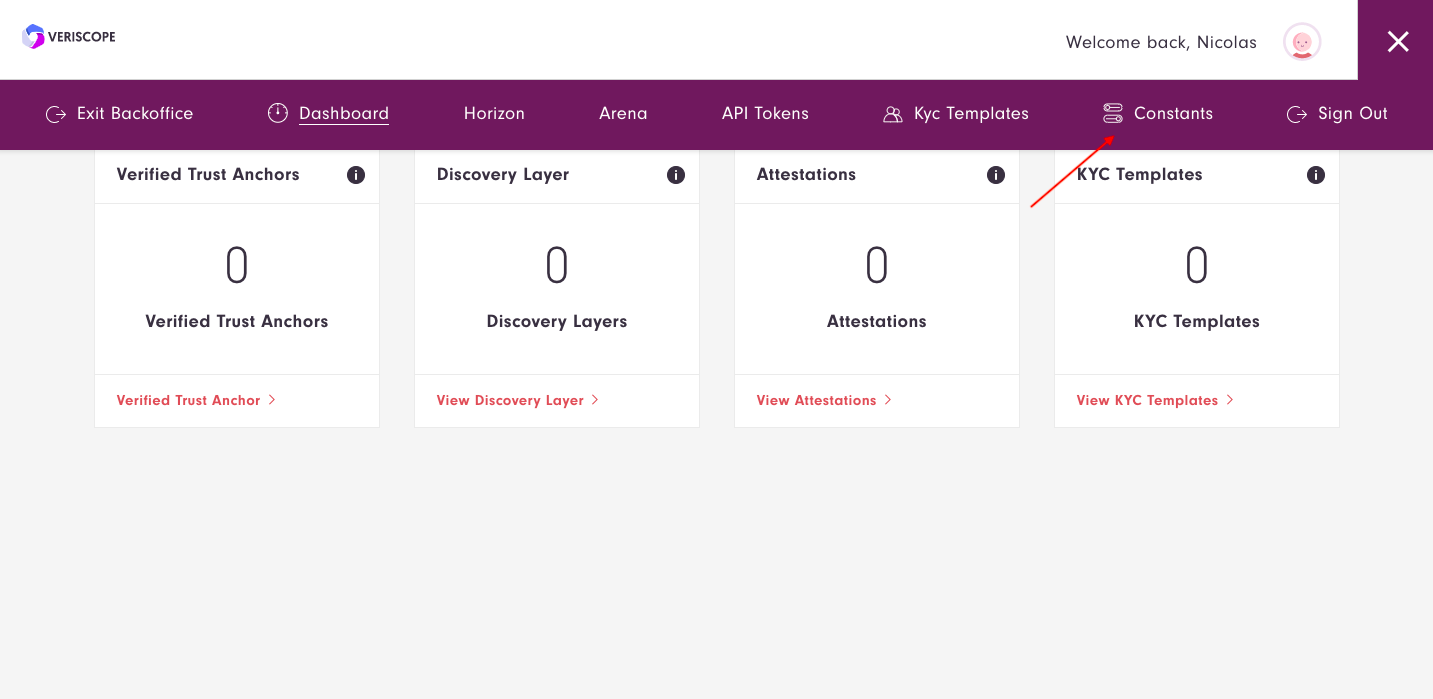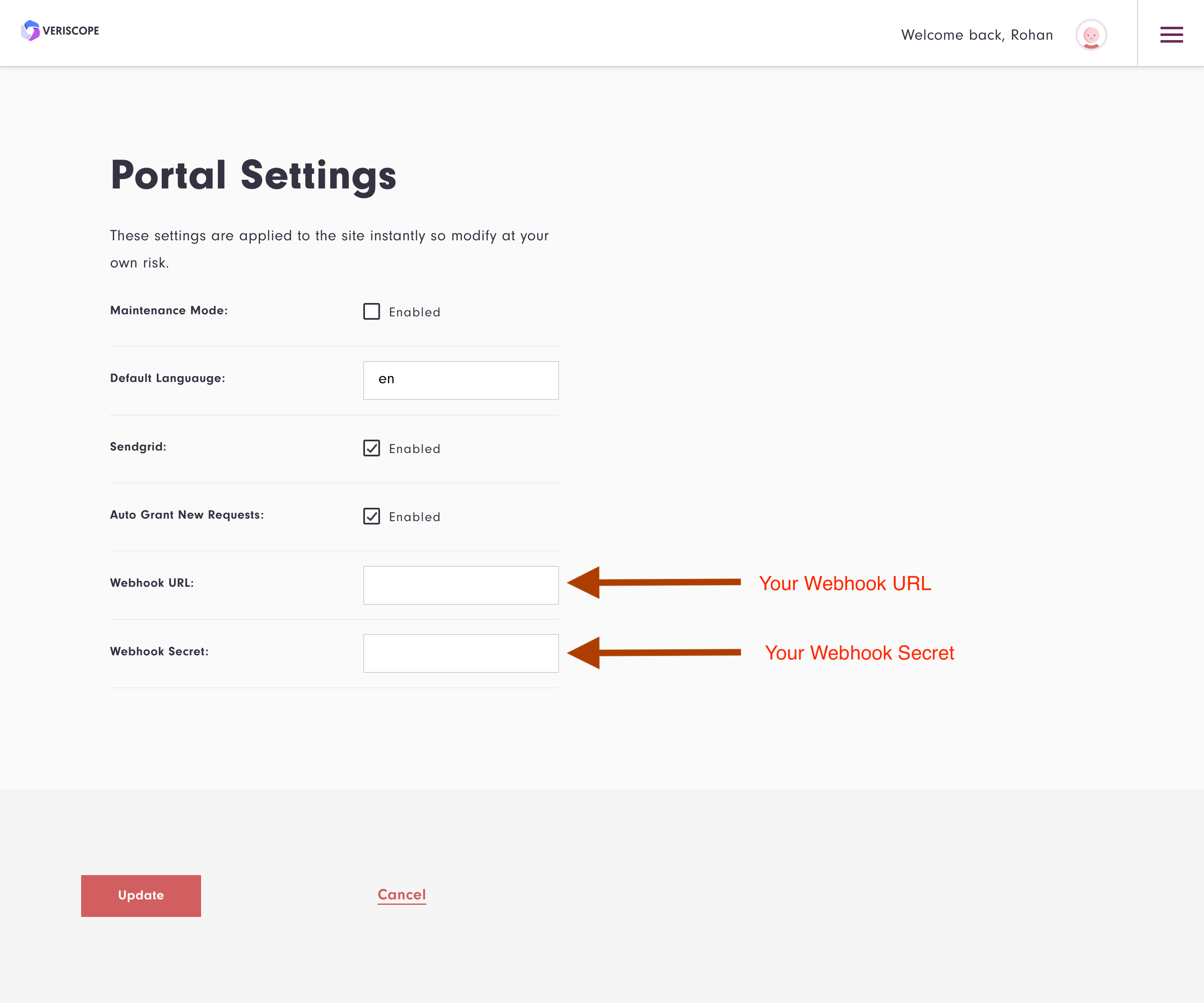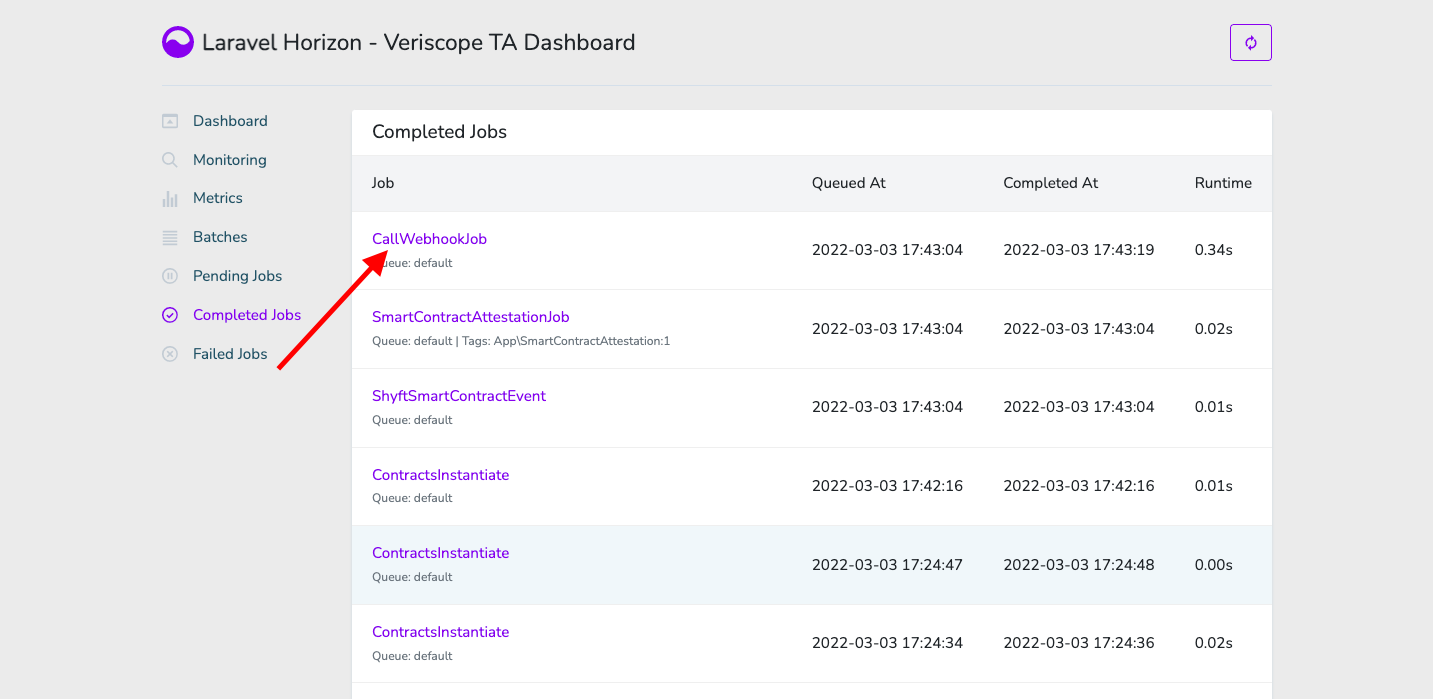WebHooks and Laravel Horizon Setup
When VASPs post attestations to the Shyft Blockchain in Step 1 these attestations arrive to all connected VASPs in Step 2 as events.

Attestations in Step 2.1 are sent over to the Exchange via a custom webhook that is configured below.
As you can imagine there will be millions of attestations in the Shyft Blockchain, one for every crypto withdrawal from each Exchange. Therefore Veriscope uses a Horizon/Redis queuing framework to post these attestations as they arrive directly to the exchange.
When the exchange receives the attestation, it can confirm if the crypto address (in the attestation) is a deposit address on their exchange. If so, it can proceed by preparing the KYC Template (Step 3).
Below describes the setup and configuration for Horizon.
Install Horizon (Step 15 in the install-script, if not done already)
sudo scripts/setup-vasp.sh+ Located in /opt/veriscope/
+ Service user will be forge
1) Refresh dependencies
2) Install/update nethermind
3) Set up new postgres user
4) Obtain/renew SSL certificate
5) Install/update NGINX
6) Install/update node.js web service
7) Install/update PHP web service
8) Update static node list for nethermind
9) Create admin user
10) Regenerate webhook secret
11) Regenerate oauth secret (passport)
12) Regenerate encrypt secret (EloquentEncryption)
13) Install Redis server
14) Install Passport Client Environment Variables
15) Install Horizon
16) Install Address Proofs
i) Install Everything
p) show daemon status
w) restart all services
r) reboot
q) quit
Choose what to do:
|
Stop ta-node-1 service
sudo systemctl stop ta-node-1Restart ta-node-1 service
sudo systemctl restart ta-node-1You can either step through each step — see note below — or choose i (Install Everything) and run steps 9 & 16 once that has completed.
|
For step 16 (
|
Run Step 15
Webhook configuration for Horizon
Log into the backoffice and choose Constants.

When in constants (Portal Settings) add your custom Webhook URL and Webhook Secret.
Choose Update to save the Webhook URL and Secret.
| Webhook URL should be the Exchange host API service to receive attestations (Step 2.1 and Step 2.2 above). |

Webhook Jobs
When Veriscope receives an attestation event (Step 2.1) it will add the payload to Horizon and post it to the Webhook URL.
To view Completed Jobs, navigate to the Horizon Dashboard.

Choose Completed Jobs.

Successful Webhook jobs are called "CallWebhookJob". To view the job details choose "CallWebhookJob".

Displayed are the details of the Webhook Post.

Below is an example of the payload sent to the Webhook URL.
{
"ta_account": "0x1bD8d3A9AF399Bfdcd17e45DA27c13C05ef64892",
"jurisdiction": "1",
"effective_time": "1615913522",
"expiry_time": "1679158322",
"is_managed": "1",
"attestation_hash": "0xdfd0a3b7766bc7f9ae5af62ba814a6e9e860e4da6bca90fc31865b50c8f79e5f",
"transaction_hash": "0x3a6890fae7782203c0b2e66385e1bc304da0c698251ebda913b4ec5230adce6b",
"user_account": "0xDAe1743aE4F79DdEa582C3BF2CdF582F1514e365",
"public_data": "0x313233",
"public_data_decoded": "123",
"documents_matrix_encrypted": "0x3738396338356366346230656333323030633435643162346464343865343331303362306639393964353634316635356637356563346364393833306530303933646539363031666337663639636662666137383366663439663837666564616437616666333262353134363063393264366164656233363139313632346362613833353438393164313733393033613566326434383933653132353438613737336261313432393133343834323439343636346132313039353638343432373963636639393434656635313530313434353531313434353531313434353531313463353530306363356565386435303063633535303063633564613561643761366532373330393962386366376239666537346463376637663665623733353432",
"documents_matrix_encrypted_decoded": "789c85cf4b0ec3200c45d1b4dd48e43103b0f999d5641f55f75ec4cd9830e0093de9601fc7f69cfbfa783ff49f87fedad7aff32b51460c92d6adeb36191624cba8354891d173903a5f2d4893e12548a773ba1429134842494664a210956844279ccf9944ef515014455114455114455114c5500cc5ee8d500cc5500cc5da5ad7a6e273099b8cf7b9fe74dc7f7f6eb73542",
"availability_address_encrypted": "0x2020202020202020202020202020202020202020202020202020202020202020",
"availability_address_encrypted_decoded": null,
"version_code": "3",
"coin_blockchain": "ETH",
"coin_token": "USDC",
"coin_address": "0x6ec88a2cb932eb46dfda0280c0eadb93b6eca13b",
"coin_memo": "123"
}"coin_address": "0x6ec88a2cb932eb46dfda0280c0eadb93b6eca13b" is the crypto wallet address to store and query against (VASP owned) deposit addresses.
Signature is the header param you can use to verify the webhook payload originated from Veriscope.
Signed Signature Verification
We add a header called Signature that will contain a signature the receiving app can use to ensure the payload hasn’t been tampered with. This is how that signature is calculated:
// payload is the array passed to the `payload` method of the webhook
// secret is the string given to the `signUsingSecret` method on the webhook.
$payloadJson = $payload;
$signature = hash_hmac('sha256', $payloadJson, $secret);Sample code
$payload = '{"ta_account":"0x1bD8d3A9AF399Bfdcd17e45DA27c13C05ef64892","jurisdiction":"1","effective_time":"1616519661","expiry_time":"1679764461","is_managed":"1","attestation_hash":"0x2b9094e7dd7ab75ca33c061491e3a67abd0442c1513e78ddbaeba9796ba53d07","transaction_hash":"0x40e6cb3187442af3f9c6b0b1715ebdd25a2e0fc1e111b8d9d9b4da5889de149d","user_account":"0xB7391F81113F7CaBca9FCbb90Bb7db4EE8Fe576a","public_data":"0x686f72697a6f6e","public_data_decoded":"horizon","documents_matrix_encrypted":"0x373839633835643134623732383333303130303435303963356363343335366232643938396632343734396164636333653536626535376365393731353339353164373834316162653865313231653436646262666333646166656265646562613666666265653937666165656263376566346237363539376231336664356365643733373535396465323436346635613334396361396164316134636231616436363463383361623263396334346463343831633061343832653831333039613430663234313937353436333039326431313938333331313930376466636561646438623931373261343663356138313831356133363235343863386135313731326134656335636634666132653235343963386135333731323835363039343630336662373734306638653430306134646162313030363535313062363064613331316135653135346532303030343631643536643638643561663439616335363163346138643931613031366235393066383164353839326130623336353430393538303764653938383063646562623430313537303137363430346262303565376461393762326461303636626566666666633133666465653235316231","documents_matrix_encrypted_decoded":"789c85d14b7283301004509c5cc4356b2d989f24749adcc3e56be57ce97153951d7841abe8e121e46dbbfc3dafebedeba6ffbee97faeebc7ef4b76597b13fd5ced737559de2464f5a349ca9ad1a4cb1ad664c83ab2c9c44dc481c0a482e81309a40f241975463092d11983311907dfceadd8b9172a46c5a81815a362548c8a51712a4ec5cf4fa2e2549c8a53712856094603fb7740f8e400a4dab10065510b60da311a5e154e2000461d56d68d5af49ac561c4a8d91a016b590f81d5892a0b3654095807de9880cdebb401570176404bb05e7da97b2da066beffffc13fdee251b1","availability_address_encrypted":"0x2020202020202020202020202020202020202020202020202020202020202020","availability_address_encrypted_decoded":null,"version_code":"3","coin_blockchain":"ETH","coin_token":"USDC","coin_address":"0x930474f6a0732b71f8a5fabc7db1ef054925cf37","coin_memo":"horizon"}';
$secret= "super secret";
$signature = hash_hmac("sha256", $payload, $secret);
echo $signature;
// 9c7a2858b452cdd10bbc36453e6c95d0c8841112606d1092131469596b363571
//headers
Content-Length: 2170
Content-Type: application/json
Signature: 9c7a2858b452cdd10bbc36453e6c95d0c8841112606d1092131469596b363571import javax.crypto.Mac;
import javax.crypto.spec.SecretKeySpec;
import java.security.NoSuchAlgorithmException;
import java.security.InvalidKeyException;
import javax.xml.bind.DatatypeConverter;
class Main {
public static void main(String[] args) {
try {
String key = "the shared secret key here";
String message = "[JSON PAYLOAD]";
Mac hasher = Mac.getInstance("HmacSHA256");
hasher.init(new SecretKeySpec(key.getBytes(), "HmacSHA256"));
byte[] hash = hasher.doFinal(message.getBytes());
// to lowercase hexits
DatatypeConverter.printHexBinary(hash);
}
catch (NoSuchAlgorithmException e) {}
catch (InvalidKeyException e) {}
}
}